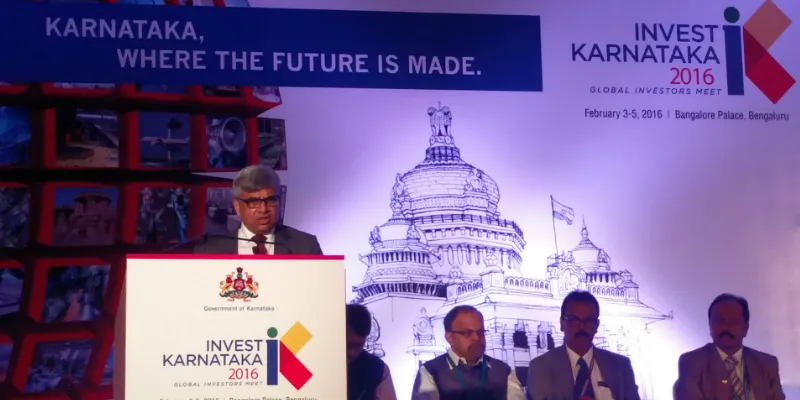Karnataka is the only state we are investing in: Kamal Bali, MD, Volvo India
At day two of the ‘Invest Karnataka 2016’, Global Investors Meet, Kamal Bali, MD of Volvo India, as a part of the ‘Auto and machine tools’ panel spoke about Volvo Group’s journey in India and how Bengaluru (and Karnataka) has played an important role in it.

Karnataka – the obvious destination
While giving an overview of Karnataka’s growth that had contributed 5.68 per cent to India’s GDP in 2014-15, Kamal highlighted that Karnataka was the obvious choice for Volvo to setup and continue its operations because of the investor-friendly government that is quite accessible and supportive at all levels.He said,
Karnataka is the only state we are investing in. Bengaluru’s X factor is its cosmopolitan nature, climate and access to great talent pool and educational institutions. Presence of leading IT, telecommunication and heavy machinery companies along with excellent telecommunication network and optical fibre connectivity through the state add to its appeal.
17 years in Karnataka
Volvo Group had established its ‘Group Truck’ factory in Bengaluru in 1998 and expanded its operations with a new value truck in 2014. The company also established a Volvo bus factory in 2007 and in 2013 had expanded its footprint by 100 per cent. For their progressive industrial policy for 2014-19, the company aims to achieve an industrial growth of 12 per cent per annum.
It also aims to increase its GDP contribution to the manufacturing sector of Karnataka from 16.87 to 20 per cent by the end of the policy period. The company’s other goals include attracting investments to the tune of five lakh crore and creating employment opportunities for 15 lakh people.
Success in Karnataka and in the Indian subcontinent
Volvo believes that their success in Karnataka (and India) is because their goals were aligned with the national and state priorities such as developing environment-friendly products, helping urbanisation, ensuring safety standards and contributing to skill development. With their logistics, telematics, truck technology and IT services, the company aims to create a 360 degree footprint and ‘Make in India’. Volvo currently has manufacturing setups in Hosakote, Peenya, Bengaluru, and Pithambar in MP supported by 3,500 employees and 400 sales and services personnel.
Apart from manufacturing and distributing in India, Volvo also exports its construction equipment to Latin America, South America and other parts of Asia. Their buses are currently being exported to South Africa, South Asia with Europe in the pipeline. Volvo aims to enable quicker superior quality infrastructure development by building better road technologies. They also help power the Indian navy and coastguard.
Through different competitions like ‘Volvo Operator Idol competition’ and ‘Volvo fuel watch challenge’ the company aims to improve safety standards and fuel efficiency among its operators and drivers.
Through its Volvo-GMR partnership, the company helps trains unemployed youth to become operators at sites in Hyderabad, Delhi and Volvo CE demo centre in Bengaluru. RAASTA Academy provides consultation in better road building and offers postgraduate programmes and trainings in road technology.
Future plans
Volvo believes that the best way to predict the future is to create it yourself. Their long-term vision is to become the leader in sustainable transport solutions. To achieve the same, the company is keeping cognisance of five trends they believe will shape the future:
- Digitisation.
- Economic power shift from west to east.
- Widening economic disparity.
- Changing relationships between us and the planet.
- Pace of urbanisation.
Volvo’s future plans for Karnataka include utilising hybrid technology in buses that can potentially save 40 per cent fuel, decrease emissions and carbon footprint by 50 per cent and provide passengers a more enjoyable journey. Kamal ended his session with some proposals that could make Karnataka an unmatched global destination.
- Ease labour laws and related compliances to promote a spirit of fairness in employment generation, productivity and sustainability.
- Augment infrastructure availability by decongesting roads, improving infrastructure of airports and sectors like power and sanitation.
- Reduce tax-related compliances by facilitating introduction of goods and services tax (GST) and simplifying transfer pricing (TP).
- Enabling skill development through better public-private partnerships and improving effectiveness of single-window clearance.
Website:Volvo







